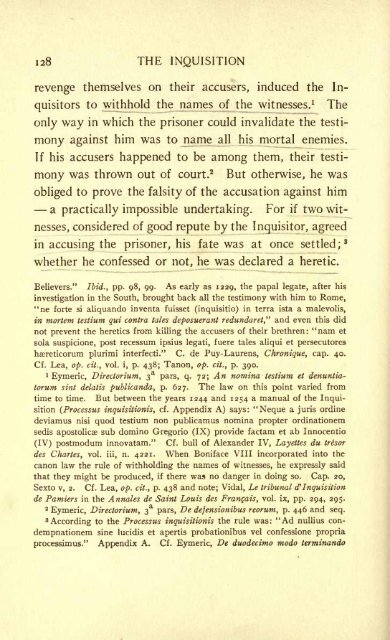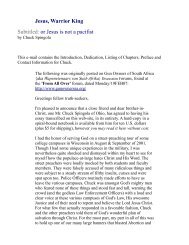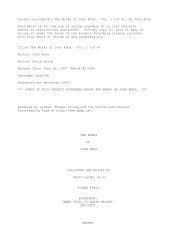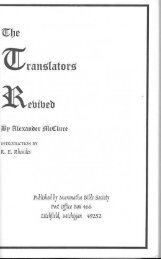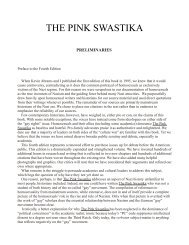Untitled - Shattering Denial
Untitled - Shattering Denial
Untitled - Shattering Denial
You also want an ePaper? Increase the reach of your titles
YUMPU automatically turns print PDFs into web optimized ePapers that Google loves.
I 28 THE INQUISITION<br />
revenge themselves on their accusers, induced the In<br />
quisitors to withhold the names of the witnesses. 1 The<br />
only way in which the prisoner could invalidate the testi<br />
mony against him was to name all his mortal enemies.<br />
If his accusers happened to be among them, their testi<br />
mony was thrown out of court. 2 But otherwise, he was<br />
obliged to prove the falsity of the accusation against him<br />
- a practically impossible undertaking. For if two wit<br />
nesses, considered of good repute by the Inquisitor, agreed<br />
in accusing the prisoner, his fate was at once settled; 3<br />
whether he confessed or not, he was declared a heretic.<br />
Believers." Ibid., pp. 98, 99. As early as 1229, the papal legate, after his<br />
investigation in the South, brought back all the testimony with him to Rome,<br />
"ne forte si aliquando inventa fuisset (inquisitio) in terra ista a malevolis,<br />
in mortem testium qui contra tales deposuerant redundaret," and even this did<br />
not prevent the heretics from killing the accusers of their brethren: "nam et<br />
sola suspicione, post recessum ipsius legati, fuere tales aliqui et persecutores<br />
haereticorum plurimi interfecti." C. de Puy-Laurens, Chronique, cap. 40.<br />
Cf. Lea, op. cit., vol. i, p. 438; Tanon, op. cit., p. 390.<br />
1<br />
Eymeric, Directorium, 3 a pars, q. 72; An nomina testium et denuntiatorum<br />
sint delatis publicanda, p. 627. The law on this point varied from<br />
time to time. But between the years 1244 and 1254 a manual of the Inqui<br />
sition (Processus inquisitionis, cf. Appendix A) says: "Neque a juris ordine<br />
deviamus nisi quod testium non publicamus nomina propter ordinationem<br />
sedis apostolicse sub domino Gregorio (IX) provide factam et ab Innocentio<br />
(IV) postmodum innovatam." Cf. bull of Alexander IV, Layettes du tresor<br />
des Chartes, vol. iii, n. 4221. When Boniface VIII incorporated into the<br />
canon law the rule of withholding the names of witnesses, he expressly said<br />
that they might be produced, if there was no danger in doing so. Cap. 20,<br />
Sexto v, 2. Cf. Lea, op. cit., p. 438 and note; Vidal, Le tribunal d Inquisition<br />
de Pamiers in the Annales de Saint Louis des Franfais, vol. ix, pp. 294, 295.<br />
2 a<br />
Eymeric, Directorium, 3 pars, De defensionibus reorum, p. 446 and seq.<br />
3<br />
According to the Processus inquisitionis the rule was: "Ad nullius con-<br />
dempnationem sine lucidis et apertis probationibus vel confessione propria<br />
processimus." Appendix A. Cf. Eymeric, De duodecimo modo terminando


